Fleurs du Mal Magazine


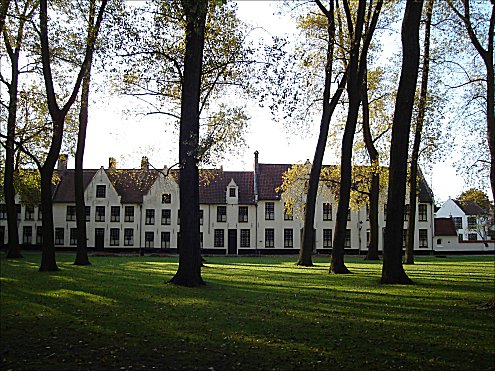
Poëzie in dubbeltijd
Poëzie en beeldende kunst in een historische context
Brugge, 23 januari – 23 mei 2010
Na 28 jaar experimenteren in een landelijke context verplaatst Gwy Mandelinck het concept van de Poëziezomer naar Brugge. Samen met een sterk artistiek team wordt een link gelegd tussen twee eeuwen poëzie en wordt verwezen naar het spanningsveld dat kan ontstaan tussen woord en beeld.
Het evenement heet ‘Poëzie in dubbeltijd’, het vers ‘een kleine ritselende revolutie’ van Lucebert dient als inspiratiebron.
Artistiek team
Algemeen concept en selectie poëzie: Gwy Mandelinck
Beeldende kunst ‘Idiolect’: Dirk Snauwaert & Kwinten Lavigne, Wiels Contemporary Art Centre, Brussel
Vormgeving tentoonstelling poëzie: Koen Van Synghel
Vormgeving tentoonstelling beeldende kunst: Erwin de Muer, Brussel
Audio-visuele aanbreng poëzie en concept video: Dirk Roofthooft
Uitvoering video: Dirk Roofthooft & Geert De Vleesschauwer
Concept poëzienacht: Gwy Mandelinck & Handelsreizigers in Ideeën
Een productie van Brugge Plus vzw i.s.m. Musea Brugge en Openbare Bibliotheek Brugge
Poëzienacht ook i.s.m. Handelsreizigers in Ideeën en Concertgebouw
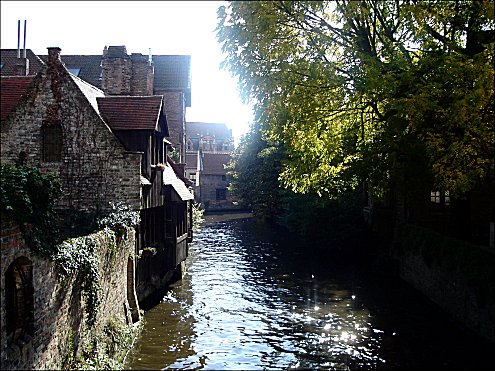
een kleine ritselende revolutie
ik draai een kleine revolutie af
ik draai een kleine mooie revolutie af
ik ben niet langer van land
ik ben weer water
ik draag schuimende koppen op mijn hoofd
ik draag schietende schimmen in mijn hoofd
op mijn rug rust een zeemeermin
op mijn rug rust de wind
de wind en de zeemeermin zingen
de schuimende koppen ruisen
de schietende schimmen vallen ik draai een kleine mooie ritselende revolutie af
en ik val en ik ruis en ik zing
Lucebert
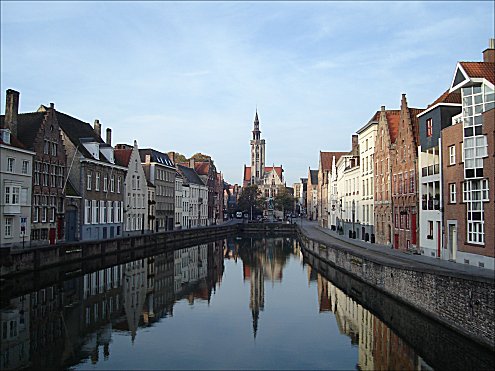
Al ritselend revolteren
Gwy Mandelinck
Het poëzieluik brengt een dwarsdoorsnee van de Nederlandstalige poëzie, van de tweede helft van de 19de eeuw tot in de 21ste eeuw. Gwy Mandelinck stelt oudere dichters tegenover debutanten met kwaliteit, en daartussenin een heel aantal poëten die zich zowel naar vorm als naar inhoud met elkaar associëren of elkaar proberen op te heffen. Zo wordt duidelijk hoe vertegenwoordigers van diverse stromingen elkaar in de loop van die tijd beïnvloedden.
Wie poëzie in Brugge integreert, kan Guido Gezelle niet ontwijken. Vijftig jaar na zijn dood werd hij door de critici tot stamvader van de experimentele poëzie ‘gepromoveerd’. Gezelle werd onverwacht de wat verborgen menner van een kleine revolutie in de Nederlandse letteren. De Vijftigers zorgden voor een even ophefmakende breuk in onze letteren. Na hen drongen zich talloze stromingen op, van neo-experimentelen over concrete en visuele poëzie, nieuw-realisme en neoromantiek tot het postmodernisme. In het begin van de 21ste eeuw maken diverse jonge dichteressen hun entree met een geprononceerd elan. De ‘creolisering’ binnen één taal groeit uit poëtica’s die zich in grote diversiteit etaleren.
Dirk Snauwaert, curator beeldende kunst, tast onder de noemer “Idiolect” af wat een hedendaagse poëtica vandaag kan betekenen. Hij baseert zich daarbij op het begrip creolisering, een verschijnsel dat zich vooral in regio’s zoals de Caraïben, de Antillen, Suriname… manifesteert. Diverse talen en culturele fenomenen vermengen zich. Men zou een parallel kunnen trekken met wat zich in de Nederlandstalige poëzie van de laatste twee eeuwen voltrok.
Het beeldend verhaal staat in zekere mate los van wat zich afspeelt in de dichterskeuken. Toch laten de kunstenaars in dit project zich inspireren door Edouard Glissant – dichter en filosoof afkomstig uit Martinique. Een tiental beeldende kunstenaars krijgen de kans om hun poëtica in Brugge uit te werken. Zo ontstaat een benadering van wat vandaag in de beeldende kunst als een poëtische taal, proces of praktijk gedefinieerd kan worden.
Zijn de poëtica’s die zich na Gezelle tot op vandaag in Vlaanderen en Nederland hebben ontwikkeld parallellen met Edouard Glissants visie en die van Dirk Snauwaert? ‘een kleine ritselende revolutie’ exploreert de invloed die de ene dichter op de andere uitoefent. En stelt de vraag of de ene discipline de andere versterkt of deformeert.
De gedichten en kunstwerken in het kader van ‘een kleine ritselende revolutie’ zijn geïntegreerd in de Brugse Sint-Annawijk (‘de verloren hoek’), met een uitloper in het Arentshuis en op het Belfort.
Het Gezellemuseum is de uitvalbasis van het parcours. Architect-criticus Koen Van Synghel geeft het wat oubollige interieur een nieuwe look, waarin een aantal topgedichten van Gezelle worden geïntegreerd. Met stoelengaanderijen geeft hij zowel de bezoeker als het kunstwerk een windscherm en eventueel een onderdak.
Acteur Dirk Roofthooft helpt met zijn stem en/of met fragmenten van zijn lichaam een vaste lijn te trekken doorheen het project. Via schermen is te zien hoe hij aan de poëzie een heel eigen, gedurfde interpretatie geeft.

fleursdumal.nl magazine
photos: jef van kempen2009
More in: Art & Literature News
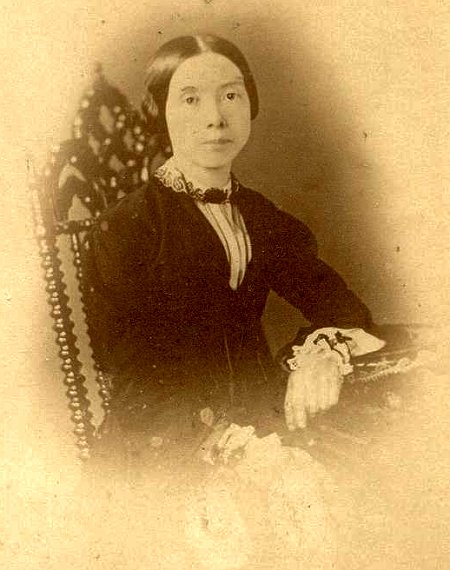
E m i l y D i c k i n s o n
(1830-1886)
This is my letter to the world
This is my letter to the world,
That never wrote to me, —
The simple news that Nature told,
With tender majesty.
Her message is committed
To hands I cannot see;
For love of her, sweet countrymen,
Judge tenderly of me!
I shall know why
I shall know why, when time is over,
And I have ceased to wonder why;
Christ will explain each separate anguish
In the fair schoolroom of the sky.
He will tell me what Peter promised,
And I, for wonder at his woe,
I shall forget the drop of anguish
That scalds me now, that scalds me now.
I never lost as much but twice
I never lost as much but twice,
And that was in the sod;
Twice have I stood a beggar
Before the door of God!
Angels, twice descending,
Reimbursed my store.
Burglar, banker, father,
I am poor once more!
Lost
I lost a world the other day.
Has anybody found?
You’ll know it by the row of stars
Around its forehead bound.
A rich man might not notice it;
Yet to my frugal eye
Of more esteem than ducats.
Oh, find it, sir, for me!

Emily Dickinson poetry
kempis poetry magazine
More in: Dickinson, Emily
.jpg)
J a n G i e l k e n s
E e n M e i v a n M e l l e
‘Jô – ik kan toch zó prachtig schilderen, hè.’
Herman Gorter vond dat de bundels met zijn eigen gedichten simpel en dus mooi moesten zijn. Zolang hij er het toezicht op had waren ze dat. Alleen de eerste druk van Mei in 1889 had een traditionele negentiende-eeuwse band met een bloemversiering. Vanaf Verzen, dat een jaar later verscheen, hadden Gorters boeken bruinrode of rode linnen banden of crèmekleurige papieren omslagen.
Saai, zal menigeen denken, en er komen dan ook exemplaren voor waaraan een bezitter heeft zitten knutselen. Zo bezit ik een zesde druk van Mei uit 1921, die van zichzelf in rood linnen gebonden is, met daarop subtiele zwarte strepen. Maar iemand heeft stroken zwart papier over de goudstempeltjes met auteursnaam en titel op de rug geplakt en bovendien zowel over het voor- als het achterplat nog eens net zulke stroken papier in de vorm van kruizen, en wel zo dat titel van het boek (er staat geen auteursnaam op het voorplat) verborgen blijft. Waarom? Wellicht is het na 1927 gedaan ter herinnering aan de toen overleden dichter? Of gebeurde het tijdens de Duitse bezetting om een boek van een bekende socialist onherkenbaar te maken?
.jpg)
Bijzonder is het exemplaar van de achtste druk van Mei uit 1940, dat ik voor weinig geld kocht bij een handelaar op de wekelijkse Haagse boekenmarkt. Het is er een met een crèmekleurig omslag, zoals die bij een aantal drukken naast de roodlinnen exemplaren verschenen. Op het voorplat staat een tekening. De handelaar dacht misschien wel: Gorter is toch al geen auteur om geld mee te verdienen, en dan een zoveelste druk, en iemand heeft dit exemplaar bovendien verpest met gedoedel, het moet dus maar op de tafel met de goedkope boeken.
Ik kocht het boek vanwege de curiositeit, zonder te weten wat het precies was, zoals ik ook dat exemplaar met de kruizen had gekocht. Wát het was stond op een briefje dat in het boek lag en dat al snel na de aankoop te voorschijn kwam: de doedel op het voorplat is een originele pentekening van de surrealistische tekenaar en schilder Melle Oldeboerrigter (1908-1976). Het is een landschapje. Misschien is het wel een illustratie bij Mei-regels als deze: ‘als in een droom / Schijnt hoog gegroeid riet heen en weer te wiegen / Met schaarse starren barnend als vuurvliegen.’ De Melle-kenners laten bij navraag weten dat ze dit soort praktijken van de kunstenaar niet kennen.
Waar komt dit boek vandaan? Er zit een exlibris op het schutblad, en dat is van de Amsterdamse arts en boekenverzamelaar Bob Luza, die in 1980 overleed en wiens bibliotheek in 1981 bij Van Gendt werd geveild. Maar in de catalogus van deze veiling komt deze Gorter niet voor.
Er zit nog iets in het boek: een krantenknipsel met de Kronkel ‘Vaarwel’ uit Het Parool van 28 mei 1976, vier dagen na het overlijden van Melle. Simon Carmiggelt vertelt over enkele ontmoetingen met de kunstenaar. Tijdens een van die ontmoetingen zei Melle volgens Carmiggelt: ‘Jô – ik kan toch zó prachtig schilderen, hè.’ En Carmiggelt antwoordde terecht: ‘Vind ik ook’.
Eerder gepubliceerd op: www.teksteditie.org
k e m p i s p o e t r y m a g a z i n e
More in: - Book Stories, Gorter, Herman, Jan Gielkens
.jpg)
A l f o n s i n a S t o r n i
(1892-1938)
Tu me quieres blanca
Tú me quieres alba,
Me quieres de espumas,
Me quieres de nácar.
Que sea azucena
Sobre todas, casta.
De perfume tenue.
Corola cerrada
Ni un rayo de luna
Filtrado me haya.
Ni una margarita
Se diga mi hermana.
Tú me quieres nívea,
Tú me quieres blanca,
Tú me quieres alba.
Tú que hubiste todas
Las copas a mano,
De frutos y mieles
Los labios morados.
Tú que en el banquete
Cubierto de pámpanos
Dejaste las carnes
Festejando a Baco.
Tú que en los jardines
Negros del Engaño
Vestido de rojo
Corriste al Estrago.
Tú que el esqueleto
Conservas intacto
No sé todavía
Por cuáles milagros,
Me pretendes blanca
(Dios te lo perdone),
Me pretendes casta
(Dios te lo perdone),
¡Me pretendes alba!
Huye hacia los bosques,
Vete a la montaña;
Límpiate la boca;
Vive en las cabañas;
Toca con las manos
La tierra mojada;
Alimenta el cuerpo
Con raíz amarga;
Bebe de las rocas;
Duerme sobre escarcha;
Renueva tejidos
Con salitre y agua;
Habla con los pájaros
Y lévate al alba.
Y cuando las carnes
Te sean tornadas,
Y cuando hayas puesto
En ellas el alma
Que por las alcobas
Se quedó enredada,
Entonces, buen hombre,
Preténdeme blanca,
Preténdeme nívea,
Preténdeme casta.
![]()
Alfonsina Storni poetry
fleursdumal.nl magazine
More in: Archive S-T, Storni, Alfonsina
.jpg)
P. A. d e G é n e s t e t
(1829 – 1861)
Matth. VI: 16.
Niet voor de Menschen
I
Voor de menschen klaag uw leed
Niet te luide, niet te lange,
Niet te bange:
Meest vertooning scheurt haar kleed.
Pronk niet met geleden smarte;
Eenvoud voegt het rouwend harte;
Stilte is tolk van ’t diep gemoed,
Meer dan wanhoops tranenvloed.
De eedle ziel, bij ’t heilig lijden,
Heeft haar fierheid ; vreest der schaar
Oppervlakkig treurgebaar,
Als den troost der ongewijden;
Wat voor allen, niet voor háár!
Moge een traan het oog ontgljden,
Echte droefheid, bleek maar schoon,
Draagt heur wonden niet ten toon.
Doch de nachtwaak ziet haar strijden,
Doch háár Trooster kent haar rouw,
En die zij beweent haar trouw!
II
Kunt gij ’t overvloeiend hart
Niet beheerschen? ’t Juk der smart,
’t Heilig kruis niet stille dragen?
Móet ge luide uw jammer klagen,
Handenwringen, waarom vragen?
Uitkomst zoeken in geween?
Ga, beproefde,
Zielsbedroefde,
Gij óók – in den hof, alléén!
Niet voor állen slaak uw klachte;
Voor den Kenner der gedachte,
Voor den Hoorder der gebeên,
Stort uw ziele uit, klaag en ween!
Ween en – bid t en ’s Heeren vrede,
– Engel, die vertroostend lacht –
Licht en kracht,
Op uw tranen, op uw bede,
Zullen dalen in uw nacht,
Straks, ô gij van God verkwikte!
„Zalf uw hoofd” en beur ’t omhoog,
Wisch de tranen uit het oog,
Dat den Hemel tegenblikte!
Toon ons geen mismaakt gelaat;
Laat óns in uw kalme trekken,
Van de rouw die niet vergaat,
Dieper ’t echte spoor ontdekken t
Eenvoud, waarheid in de smart,
Tuige ons de adel van uw hart.
.jpg)
P.A. de Génestet gedichten
k e m p i s p o e t r y m a g a z i n e
More in: Génestet, P.A. de
.jpg)
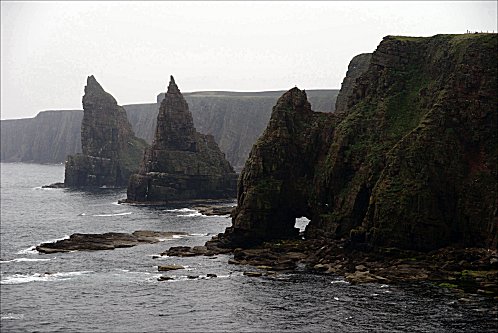
Rudyard Kipling
(1865-1936)
The White Seal
Oh! hush thee, my baby, the night is behind us,
And black are the waters that sparkled so green.
The moon, o’er the combers, looks downward to find us
At rest in the hollows that rustle between.
Where billow meets billow, there soft be thy pillow;
Ah, weary wee flipperling, curl at thy ease!
The storm shall not wake thee, nor shark overtake thee,
Asleep in the arms of the slow-swinging seas.
You mustn’t swim till you’re six weeks old,
Or your head will be sunk by your heels;
And summer gales and Killer Whales
Are bad for baby seals.
Are bad for baby seals, dear rat,
As bad as bad can be.
But splash and grow strong,
And you can’t be wrong,
Child of the Open Sea!
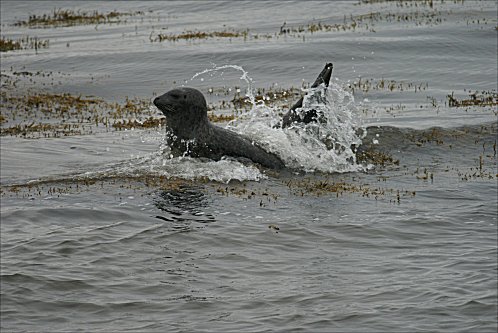
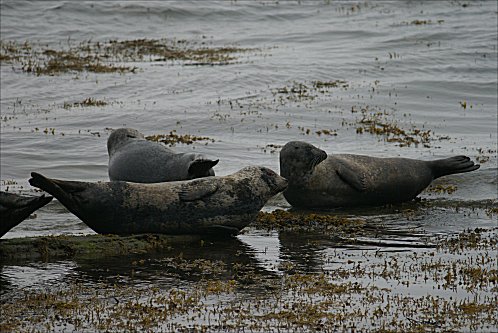
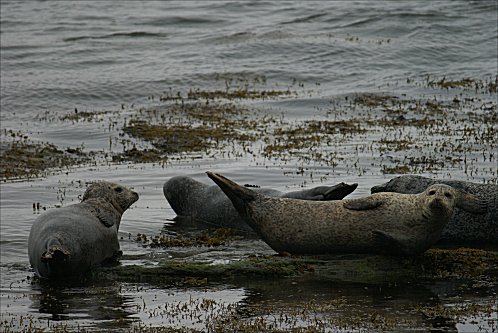
Hans Hermans Natuurdagboek – January 2010
Poem: Rudyard Kipling
Photos: Hans Hermans
fleursdumal.nl magazine
More in: Archive K-L, Archive K-L, Hans Hermans Photos, Kipling, Rudyard, MUSEUM OF NATURAL HISTORY - department of ravens & crows, birds of prey, riding a zebra, spring, summer, autumn, winter
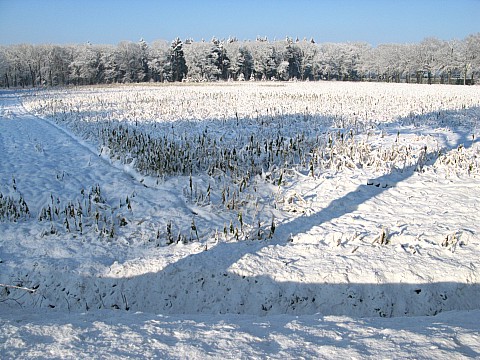
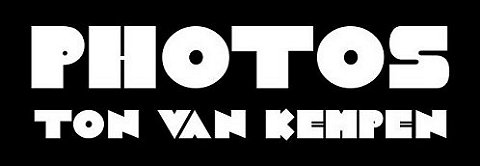
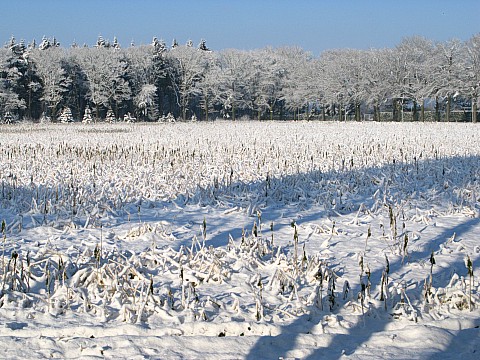
.jpg)

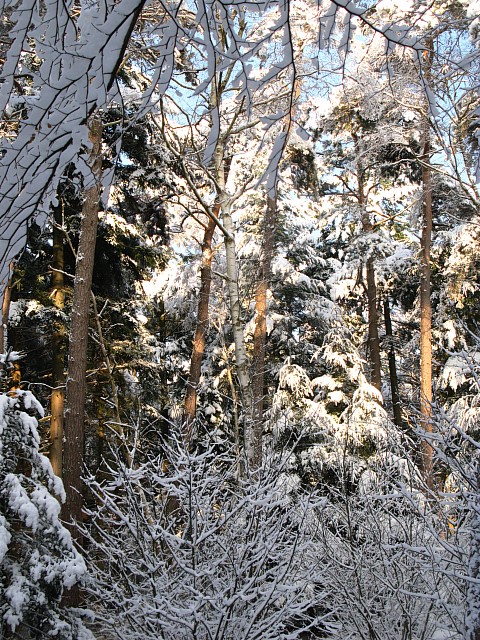
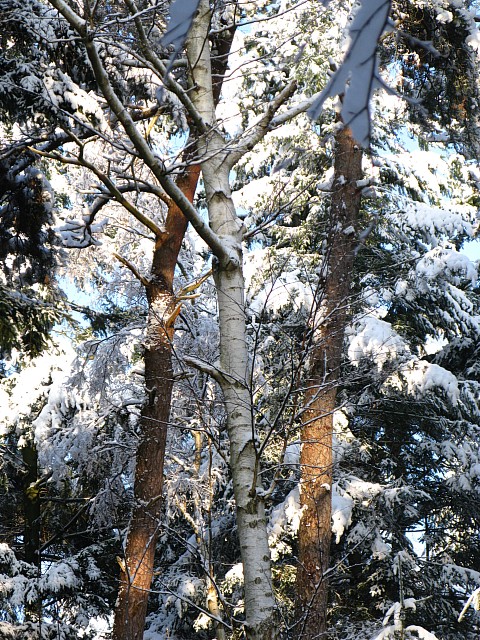
Henry Wadsworth Longfellow
(1807-1882)
The Cross of Snow
IIn the long, sleepless watches of the night,
A gentle face — the face of one long dead —
Looks at me from the wall, where round its head
The night-lamp casts a halo of pale light.
Here in this room she died; and soul more white
Never through martyrdom of fire was led
To its repose; nor can in books be read
The legend of a life more benedight.
There is a mountain in the distant West
That, sun-defying, in its deep ravines
Displays a cross of snow upon its side.
Such is the cross I wear upon my breast
These eighteen years, through all the changingscenes
And seasons, changeless since the day she died.
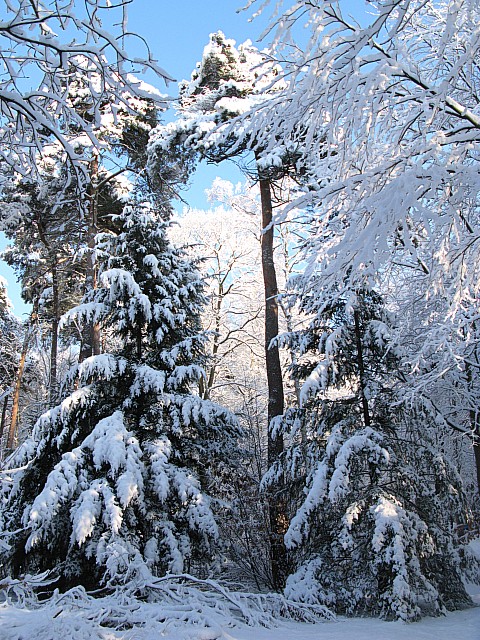
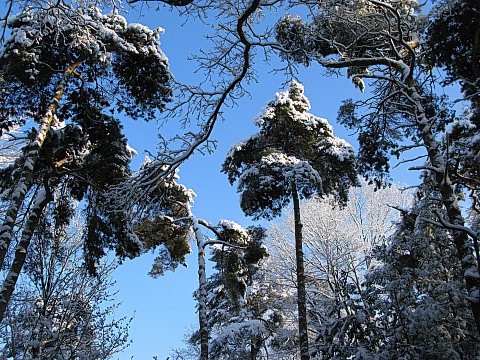
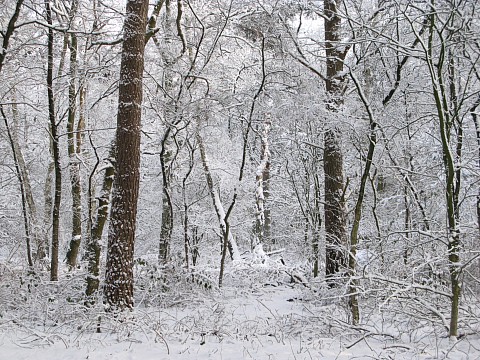
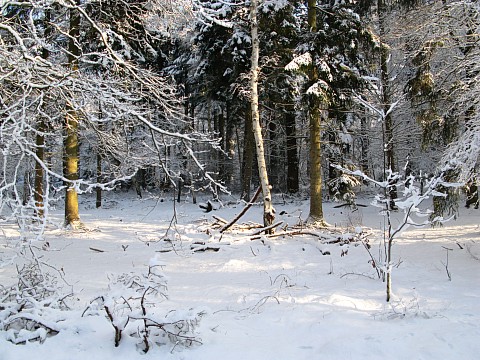
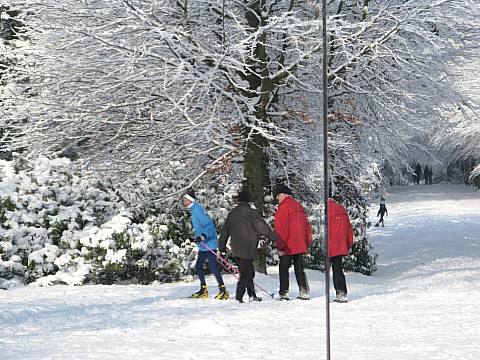

Winter 2010
Photos: Ton van kempen
Poem: H.W. Longfellow
fleursdumal.nl poetry magazine
More in: 4SEASONS#Winter, Dutch Landscapes, Longfellow, Henry Wadsworth, Ton van Kempen Photos
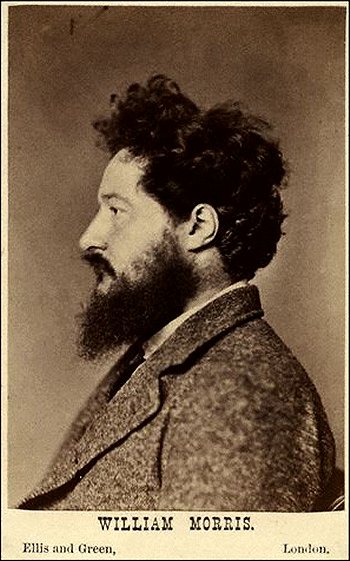
W i l l i a m M o r r i s
(1834-1896)
Mother and Son
Now sleeps the land of houses,
and dead night holds the street,
And there thou liest, my baby,
and sleepest soft and sweet;
My man is away for awhile,
but safe and alone we lie,
And none heareth thy breath but thy mother,
and the moon looking down from the sky
On the weary waste of the town,
as it looked on the grass-edged road
Still warm with yesterday’s sun,
when I left my old abode;
Hand in hand with my love,
that night of all nights in the year;
When the river of love o’erflowed
and drowned all doubt and fear,
And we two were alone in the world,
and once if never again,
We knew of the secret of earth
and the tale of its labour and pain.
Lo amidst London I lift thee,
and how little and light thou art,
And thou without hope or fear
thou fear and hope of my heart!
Lo here thy body beginning,
O son, and thy soul and thy life;
But how will it be if thou livest,
and enterest into the strife,
And in love we dwell together
when the man is grown in thee,
When thy sweet speech I shall hearken,
and yet ‘twixt thee and me
Shall rise that wall of distance,
that round each one doth grow,
And maketh it hard and bitter
each other’s thought to know.
Now, therefore, while yet thou art little
and hast no thought of thine own,
I will tell thee a word of the world;
of the hope whence thou hast grown;
Of the love that once begat thee,
of the sorrow that hath made
Thy little heart of hunger,
and thy hands on my bosom laid.
Then mayst thou remember hereafter,
as whiles when people say
All this hath happened before
in the life of another day;
So mayst thou dimly remember
this tale of thy mother’s voice,
As oft in the calm of dawning
I have heard the birds rejoice,
As oft I have heard the storm-wind
go moaning through the wood;
And I knew that earth was speaking,
and the mother’s voice was good.
Now, to thee alone will I tell it
that thy mother’s body is fair,
In the guise of the country maidens
Who play with the sun and the air;
Who have stood in the row of the reapers
in the August afternoon,
Who have sat by the frozen water
in the high day of the moon,
When the lights of the Christmas feasting
were dead in the house on the hill,
And the wild geese gone to the salt-marsh
had left the winter still.
Yea, I am fair, my firstling;
if thou couldst but remember me!
The hair that thy small hand clutcheth
is a goodly sight to see;
I am true, but my face is a snare;
soft and deep are my eyes,
And they seem for men’s beguiling
fulfilled with the dreams of the wise.
Kind are my lips, and they look
as though my soul had learned
Deep things I have never heard of,
my face and my hands are burned
By the lovely sun of the acres;
three months of London town
And thy birth-bed have bleached them indeed,
"But lo, where the edge of the gown"
(So said thy father) "is parting
the wrist that is white as the curd
From the brown of the hand that I love,
bright as the wing of a bird."
Such is thy mother, O firstling,
yet strong as the maidens of old,
Whose spears and whose swords were the warders
of homestead, of field and of fold.
Oft were my feet on the highway,
often they wearied the grass;
From dusk unto dusk of the summer
three times in a week would I pass
To the downs from the house on the river
through the waves of the blossoming corn.
Fair then I lay down in the even,
and fresh I arose on the morn,
And scarce in the noon was I weary.
Ah, son, in the days of thy strife,
If thy soul could but harbour a dream
of the blossom of my life!
It would be as the sunlit meadows
beheld from a tossing sea,
And thy soul should look on a vision
of the peace that is to be.
Yet, yet the tears on my cheek!
and what is this doth move
My heart to thy heart, beloved,
save the flood of yearning love?
For fair and fierce is thy father,
and soft and strange are his eyes
That look on the days that shall be
with the hope of the brave and the wise.
It was many a day that we laughed,
as over the meadows we walked,
And many a day I hearkened
and the pictures came as he talked;
It was many a day that we longed,
and we lingered late at eve
Ere speech from speech was sundered,
and my hand his hand could leave.
Then I wept when I was alone,
and I longed till the daylight came;
And down the stairs I stole,
and there was our housekeeping dame
(No mother of me, the foundling)
kindling the fire betimes
Ere the haymaking folk went forth
to the meadows down by the limes;
All things I saw at a glance;
the quickening fire-tongues leapt
Through the crackling heap of sticks,
and the sweet smoke up from it crept,
And close to the very hearth
the low sun flooded the floor,
And the cat and her kittens played
in the sun by the open door.
The garden was fair in the morning,
and there in the road he stood
Beyond the crimson daisies
and the bush of southernwood.
Then side by side together
through the grey-walled place we went,
And O the fear departed,
and the rest and sweet content!
Son, sorrow and wisdom he taught me,
and sore I grieved and learned
As we twain grew into one;
and the heart within me burned
With the very hopes of his heart.
Ah, son, it is piteous,
But never again in my life
shall I dare to speak to thee thus;
So may these lonely words
about thee creep and cling,
These words of the lonely night
in the days of our wayfaring.
Many a child of woman
to-night is born in the town,
The desert of folly and wrong;
and of what and whence are they grown?
Many and many an one
of wont and use is born;
For a husband is taken to bed
as a hat or a ribbon is worn.
Prudence begets her thousands;
"good is a housekeeper’s life,
So shall I sell my body
that I may be matron and wife."
"And I shall endure foul wedlock
and bear the children of need."
Some are there born of hate,
many the children of greed.
"I, I too can be wedded,
though thou my love hast got."
"I am fair and hard of heart,
and riches shall be my lot."
And all these are the good and the happy,
on whom the world dawns fair.
O son, when wilt thou learn
of those that are born of despair,
As the fabled mud of the Nile
that quickens under the sun
With a growth of creeping things,
half dead when just begun?
E’en such is the care of Nature
that man should never die,
Though she breed of the fools of the earth,
and the dregs of the city sty.
But thou, O son, O son,
of very love wert born,
When our hope fulfilled bred hope,
and fear was a folly outworn.
On the eve of the toil and the battle
all sorrow and grief we weighed,
We hoped and we were not ashamed,
we knew and we were not afraid.
Now waneth the night and the moon;
ah, son, it is piteous
That never again in my life
shall I dare to speak to thee thus.
But sure from the wise and the simple
shall the mighty come to birth;
And fair were my fate, beloved,
if I be yet on the earth
When the world is awaken at last,
and from mouth to mouth they tell
Of thy love and thy deeds and thy valour,
and thy hope that nought can quell.
.jpg)
William Morris poetry
kempis poetry magazine
More in: Morris, William
.jpg)
A n n e B r o n t ë
(1820-1849)
Past Days
‘Tis strange to think there WAS a time
When mirth was not an empty name,
When laughter really cheered the heart,
And frequent smiles unbidden came,
And tears of grief would only flow
In sympathy for others’ woe;
When speech expressed the inward thought,
And heart to kindred heart was bare,
And summer days were far too short
For all the pleasures crowded there;
And silence, solitude, and rest,
Now welcome to the weary breast–
Were all unprized, uncourted then–
And all the joy one spirit showed,
The other deeply felt again;
And friendship like a river flowed,
Constant and strong its silent course,
For nought withstood its gentle force:
When night, the holy time of peace,
Was dreaded as the parting hour;
When speech and mirth at once must cease,
And silence must resume her power;
Though ever free from pains and woes,
She only brought us calm repose.
And when the blessed dawn again
Brought daylight to the blushing skies,
We woke, and not RELUCTANT then,
To joyless LABOUR did we rise;
But full of hope, and glad and gay,
We welcomed the returning day.
![]()
Acton Bell (Anne Brontë) poetry
fleursdumal.nl magazine
More in: Anne, Emily & Charlotte Brontë, Archive A-B, Brontë, Anne, Emily & Charlotte
.jpg)

.jpg)
Luise Köningin von Preussen
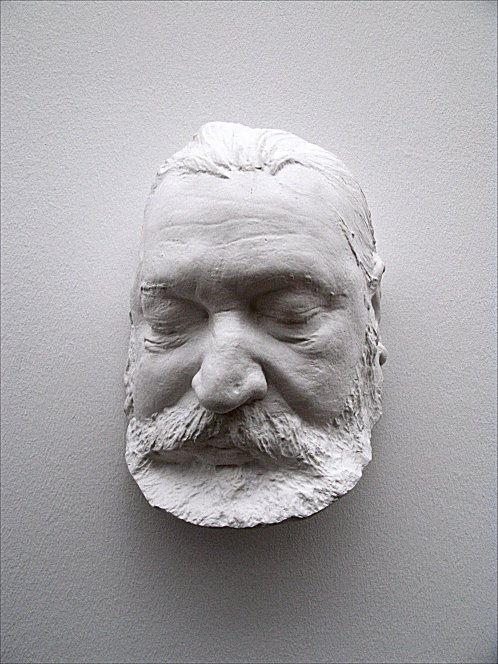
Heinrich von Treitschke
.jpg)
Franz Liszt
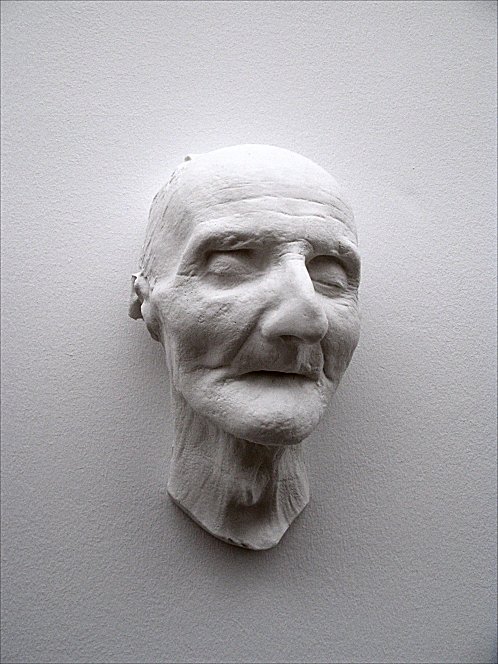
Anton Brückner
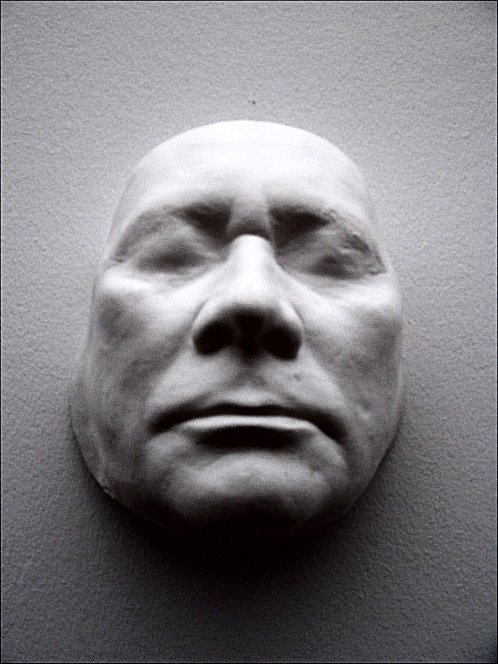
Paul Wegener
Museum Hamburger Bahnhof Berlin
Totenmasken
Nachrichten aus Berlin
Photos Anton K.
fleursdumal.nl magazine
More in: FDM in Berlin, Galerie des Morts, Nachrichten aus Berlin
.jpg)
W i l l i a m S h a k e s p e a r e
(1564-1616)
T H E S O N N E T S
20
A woman’s face with nature’s own hand painted,
Hast thou the master mistress of my passion,
A woman’s gentle heart but not acquainted
With shifting change as is false women’s fashion,
An eye more bright than theirs, less false in rolling:
Gilding the object whereupon it gazeth,
A man in hue all hues in his controlling,
Which steals men’s eyes and women’s souls amazeth.
And for a woman wert thou first created,
Till nature as she wrought thee fell a-doting,
And by addition me of thee defeated,
By adding one thing to my purpose nothing.
But since she pricked thee out for women’s pleasure,
Mine be thy love and thy love’s use their treasure.
![]()
k e m p i s p o et r y m a g a z i n e
More in: -Shakespeare Sonnets
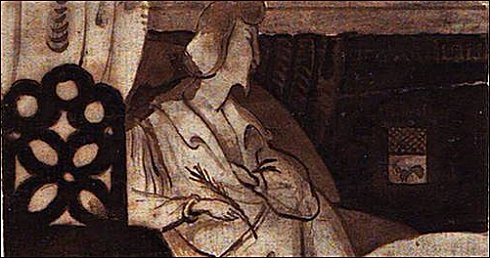
A l o y s i u s B e r t r a n d
(1807-1841)
3 P o è m e s
A M. Charles Nodier
L’homme est un balancier qui frappe une monnaie à son
coin. La quadruple porte l’empreinte de l’empereur,
la médaille du pape, le jeton du fou.
Je marque mon jeton à ce jeu de la vie où nous perdons
coup sur coup et où le diable, pour en finir, râfle
joueurs, dés et tapis vert.
L’empereur dicte des ordres à ses capitaines, le pape
adresse des bulles à la chrétienté, et le fou écrit un
livre.
Mon livre, le voilà tel que je l’ai fait et tel qu’on
doit le lire, avant que les commentateurs ne l’obscur-
cissent de leurs éclaircissements.
Mais ce ne sont point ces pages souffreteuses, humble
labeur ignoré des jours présents, qui ajouteront quelque
lustre à la renommée poétique des jours passés.
Et l’églantine du ménestrel sera fanée que fleurira
toujours la giroflée, chaque printemps, aux gothiques
fenêtres des châteaux et des monastères.
A M. David, statuaire
Non, Dieu, éclair qui flamboie dans le triangle symbolique,
n’est point le chiffre tracé sur les lèvres de la sagesse
humaine !
Non, l’amour, sentiment naïf et chaste qui se voile de
pudeur et de fierté au sanctuaire du coeur, n’est point
cette tendresse cavalière qui répand les larmes de la
coquetterie par les yeux du masque de l’innocence !
Non, la gloire, noblesse dont les armoiries ne se vendirent
jamais, n’est pas la savonnette à vilain qui s’achète, au
prix du tarif, dans la boutique d’un journaliste !
Et j’ai prié, et j’ai aimé, et j’ai chanté, poète pauvre
et souffrant ! Et c’est en vain que mon coeur déborde de
foi, d’amour et de génie !
C’est que je naquis aiglon avorté ! L’oeuf de mes des-
tinées, que n’ont point couvé les chaudes ailes de la
prospérité, est aussi creux, aussi vide que la noix dorée
de l’Égyptien.
Ah ! l’homme, dis-le-moi, si tu le sais, l’homme, frêle
jouet, gambadant suspendu aux fils des passions ; ne
serait-il qu’un pantin qu’use la vie et que brise la mort ?
A M. Victor Hugo
Le livre mignard de tes vers, dans cent ans comme
aujourd’hui, sera le bien choyé des châtelaines, des
damoiseaux et des ménestrels, florilège de chevalerie,
Décaméron d’amour qui charmera les nobles oisivetés
des manoirs.
Mais le petit livre que je te dédie, aura subi le sort
de tout ce qui meurt, après avoir, une matinée peut-
être, amusé la cour et la ville qui s’amusent de peu de
chose.
Alors, qu’un bibliophile s’avise d’exhumer cette oeuvre
moisie et vermoulue, il y lira à la première page ton nom
illustre qui n’aura point sauvé le mien de l’oubli.
Sa curiosité délivrera le frêle essaim de mes esprits
qu’auront emprisonnés si longtemps des fermaux de
vermeil dans une geôle de parchemin.
Et ce sera pour lui une trouvaille non moins précieuse
que l’est pour nous celle de quelque légende en lettres
gothiques, écussonnée d’une licorne ou de deux cigognes.

Aloysius Bertrand poetry
k e m p i s p o e t r y m a g a z i n e
More in: Bertrand, Aloysius
Thank you for reading Fleurs du Mal - magazine for art & literature